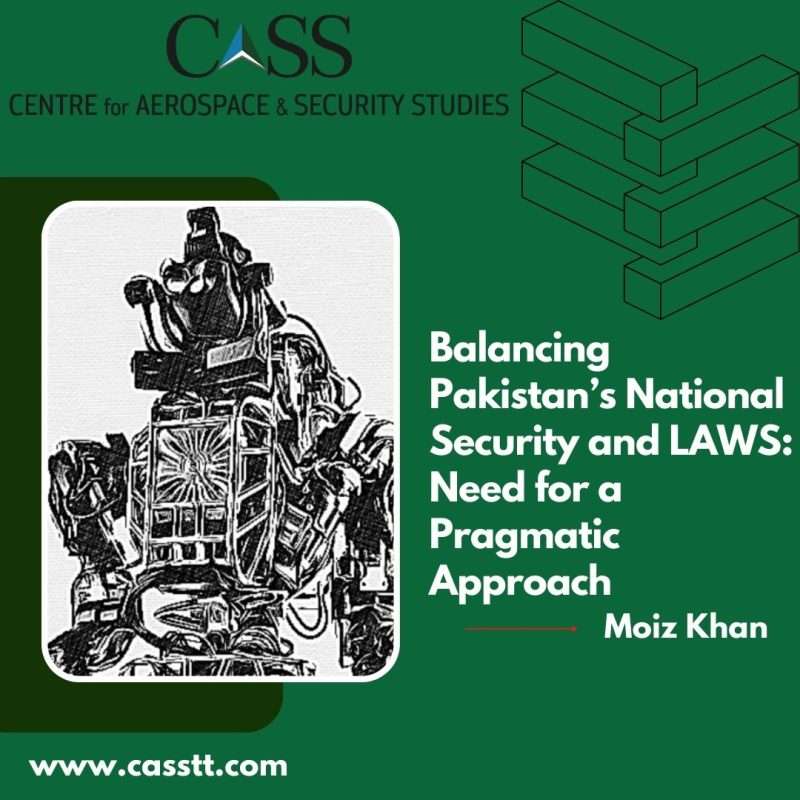Robust advancements within conventional weapons technology and amalgamation with Artificial Intelligence (AI) and Machine Learning (ML) have led to the development of Lethal Autonomous Weapon Systems (LAWS), also known as ‘Killer Robots.’ Distinct from other conventional weapons, they integrate the element of autonomy in their critical functions. LAWS autonomously perform critical tasks such as navigation, identification, tracking, and targeting using sensors and algorithms, without human control. They enhance military capability in inaccessible areas and maintain operations when communication systems fail. Additionally, LAWS reduce human casualties and costs by minimising the need for soldiers on the battlefield, offering significant strategic and tactical advantages.
However, given that LAWS possess autonomy in various weapon system functions, entrusting life-and-death decisions to machines raises numerous ethical and legal concerns. The absence of human involvement and judgement in automated targeting decisions breaches moral boundaries undermining the fundamental principles of human society. Additionally, LAWS pose challenges in the context of International Humanitarian Law (IHL), which currently lacks specific regulations for the conduct of autonomous weapons in armed conflicts. In fact, not only is there no specific international regulation on LAWS, the use of these weapons also falls beyond compliance within existing laws. For examples, LAWS may not be able to comply with the principles of distinction and proportionality, especially in complex and dynamic environments where civilians and combatants are intermingled.
Against these implications, the international community has been debating suitable regulations at the United Nations since 2013, under the framework of the 1980 Convention on Certain Conventional Weapons (CCW). A number of meetings of states and experts have been taking place in Geneva from platforms including CCW annual review conferences and meetings of the Group of Governmental Experts (GGE). However, progress has been slow and no legally binding agreement has been reached so far. Majority states are of the view to develop regulations and mechanisms to prohibit LAWS with the help of a legally binding global instrument.
Pakistan is also one of the leading voices in the campaign to ban LAWS, based on the principled stance of non-proliferation. In May 2013, Pakistan became the first country to call for prohibiting LAWS. Since then, Islamabad has been participating actively in the meetings of the GGE on LAWs under the CCW. During these engagements, Pakistan consistently proposes creation of a new international multilateral legally binding instrument. Its position is rooted in the belief that LAWs would lower the threshold of armed conflict, and increase the risk of inadvertent escalation. Pakistan also notes that LAWs violate International Human Rights Law (IHRL) and the IHL.
As Pakistan highlights the challenges and risks associated with LAWS, advocating for their prohibition on moral grounds, it concurrently grapples with ongoing military buildup in its vicinity. The country has to consider the realities of international power dynamics and the influence of arms proliferation. Presently, nations such as India, the United States, the United Kingdom, Russia, China, Israel, and South Korea are actively involved in developing LAWS. Enticed by their military potential including the precision and swiftness in identifying and eliminating the target and reduced risk to soldiers and military assets, these countries are progressing in LAWS development. Deployment of LAWS would create asymmetry in the military capabilities amongst states that would mount significant disadvantages to those who lack them, especially in South Asia.
Pakistan needs to be cognizant of the fact that prohibition of LAWS will not effectively help in aiding its national security involving wide-ranging threats from conventional to standoff warfare. Its unilateral accession to a legally binding instrument against LAWS would constrain its strategic options, reminiscent of ‘haves’ and ‘have-nots’ dichotomy previously witnessed in the case of developing nuclear weapons. The state should not strive to be among those who lack capabilities in autonomous weapons. Rather, Pakistan’s accession to any prospective legal instrument needs to be coupled with the entry of its adversary with the aim to avoid any asymmetry. Given the potentially critical role of LAWs in the military domain, states are likely to advance their Research and Development (R&D) despite calls for a blanket ban. In this backdrop, it would be ill-advised for Pakistan to bank on the remote possibility of a blanket ban. Therefore, Pakistan ought to conduct R&D on LAWS or else it would be left vulnerable to threats posed by such weapon systems.
Moiz Khan is a Research Assistant at the Centre for Aerospace & Security Studies (CASS), Islamabad, Pakistan. He can be reached at [email protected]





